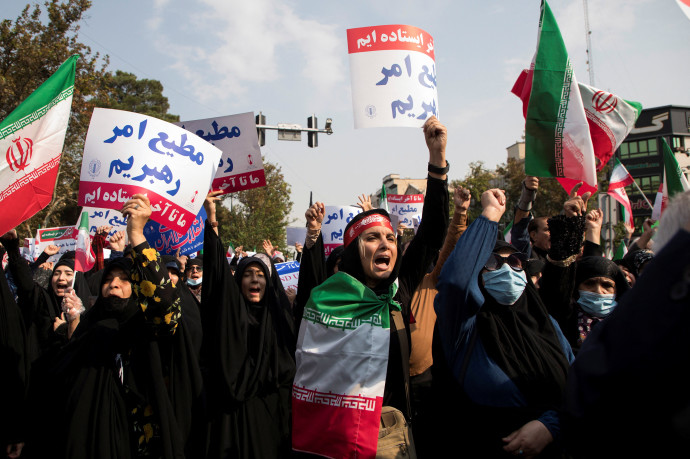The Iranian regime poses a threat to Israel and to other states as well, including the United States. There has been an increasingly dangerous web of Iranian plots all around the world, from the Caucasus to the US and the UK.
There has been unrest in Iran, which started in mid-September.
The current wave of demonstrations is the most powerful one compared with former protests. Years of living under a brutal regime while struggling to make ends meet took a heavy toll on the Iranian people.
Many of them want to topple their regime. The US would like to see regime change in Iran. On November 3, President Joe Biden argued the US would free Iran.
The US avoids regime change, following the costly conflicts in Afghanistan and Iraq. However, unlike in Afghanistan in 2001 and in Iraq in 2003, the unrest in Iran, which might bring regime change, is not a result of and certainly is not led by the US.
The Iranian opposition is a grassroots movement. This fight is therefore based on the Iranian people and this is how it should stay; however, they require help.

Iran presents a serious challenge to the US and its allies, mostly those in the Middle East. This is because of Iran’s aggressive policy that destabilizes the region and its nuclear program.
Iran might be now closer than ever to producing nuclear weapons
IAEA Director-General Rafael Grossi argued on November 16 that there is a “mass of activity about which we don’t know anything” regarding Iran’s nuclear program.
If Iran produces a nuclear arsenal, it will escalate Iran’s conflict with Israel. The latter, according to non-Israeli sources, has a nuclear arsenal. There might be a nuclear war between Israel and Iran, which might occur not only because of the mutual hostility between them but also by mistake due to miscalculations.
Another major implication is that following Iran, other states in the Middle East like Saudi Arabia might acquire nuclear weapons, making that region much more dangerous, not only for those who live there. A new Iranian regime might be more moderate.
Even if it keeps the nuclear program, it might not develop nuclear weapons. Despite this uncertainty, it is better than having the current Iranian regime.
US attention, regarding conflicts, has been focused on the war in Ukraine. Iran too has been involved in the war in Ukraine, by helping Russia such as by providing drones that attacked the Ukrainian population.
The Iranian regime, which causes suffering to populations across the Middle East, including the Iranians, now does it in Europe. The Iranian regime, by associating itself with Russia, tarnishes its image even more. Replacing the Iranian regime would cripple Russia’s war effort.
THE IRANIAN regime has been intervening in Arab internal affairs across the Middle East, particularly in Iraq, Syria, Yemen and Lebanon. Iran seeks to have pro–Iranian regimes in Arab states.
Bringing down the Iranian regime would serve key US interests in the Middle East, such as stabilizing and rebuilding Arab countries like Iraq.
Iran, by investing significant amounts of funds in intervening in Arab countries does it at the expense of the basic needs of the Iranian people.
This led to the current outburst in Iran. Ironically, trying to control other states might cause the Iranian regime to lose control of its own country. It would be poetic justice.
On November 16, the US imposed fresh Iran-related sanctions, targeting six individuals linked to state-run broadcaster Islamic Republic of Iran Broadcasting (IRIB).
The Treasury said the media corporation acts as a critical tool in the Iranian government’s mass suppression and censorship campaign against its own people. The US could do more to help the Iranian opposition. US support does not have to be very costly.
The Iranian regime cut off the internet in part of Iran, to make it harder for the Iranian opposition to plan and carry out its plans.
Helping the Iranian opposition
The US and its allies could use their advanced cyber and electronic capability to help the Iranian opposition in this matter.
The Iranian opposition also requires financial support for basic needs such as food, communication, and self-defense such as protective gear, etc.
It is possible that some of the money and resources that would be sent to Iran would reach the wrong hands but even if some of this aid ends up where it is supposed to, it would help.
Such a contribution can be significant both practically and by letting the Iranian opposition know they are not alone in this fight.
There should also be an effort to mobilize minorities in Iran, which are suppressed in Iran such as Arabs, Kurds, etc. They, too, would like to bring down the Iranian regime.
All in all, despite the bad experience the US has had with regime change in Iraq and Afghanistan, the circumstances in Iran are different.
The Iranian people started this and they are keeping on the fight, although they absorb heavy losses and had to deal with mass arrests and other dangers. The Biden administration can, unofficially or not, do more to help the Iranian opposition.
The writer has been dealing with and studying Israel’s national security for more than 25 years. He served in the military and later worked for the Defense Ministry as a researcher. He has published six books, including his latest, Israeli Strategies in the Middle East: The Case of Iran (Palgrave Macmillan, 2022). His email is Ehudmh2014@gmail.com.
